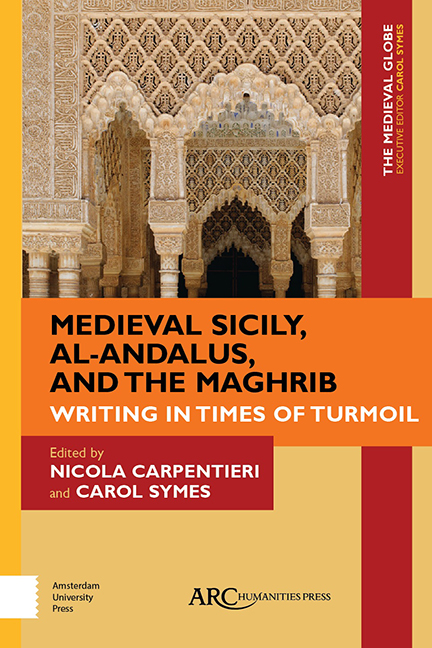Book contents
- Frontmatter
- Contents
- Acknowledgements
- Introduction
- The Indiculus luminosus and the Creation of a Ninth-Century Prophetic Conflict between Christianity and Islam
- Empire and Caliphate in the Life of John of Gorze
- The Writing of Munāẓarāt in Times of Turmoil: Disputations inFatimid Ifrīqiya
- Messaging and Memory: Notes from Medieval Ifrīqiya and Sicily
- “And God Dispersed Their Unity”: Historiographical Patterns in Recounting the End of Muslim Rule in Sicily and al-Andalus
- A Wondrous Past, a Dangerous Present: The Egyptian Temple of Akhmīm and the Martorana Church in Palermo, as Seen through Ibn Jubayr’s Travelogue
- How Does a Moorish Prince Become a Roman Caesar? Fictions and Forgeries, Emperors and Others from the Spanish “Flores” Romances to the Lead Books of Granada
- Index
Introduction
Published online by Cambridge University Press: 20 November 2020
- Frontmatter
- Contents
- Acknowledgements
- Introduction
- The Indiculus luminosus and the Creation of a Ninth-Century Prophetic Conflict between Christianity and Islam
- Empire and Caliphate in the Life of John of Gorze
- The Writing of Munāẓarāt in Times of Turmoil: Disputations inFatimid Ifrīqiya
- Messaging and Memory: Notes from Medieval Ifrīqiya and Sicily
- “And God Dispersed Their Unity”: Historiographical Patterns in Recounting the End of Muslim Rule in Sicily and al-Andalus
- A Wondrous Past, a Dangerous Present: The Egyptian Temple of Akhmīm and the Martorana Church in Palermo, as Seen through Ibn Jubayr’s Travelogue
- How Does a Moorish Prince Become a Roman Caesar? Fictions and Forgeries, Emperors and Others from the Spanish “Flores” Romances to the Lead Books of Granada
- Index
Summary
BEGINNING IN THE seventh century, Muslim expansion into the western Mediterranean initiated a new phase in the long-lasting layering of heterogeneous peoples, confessions, and languages within that ecumene. Arabs and Berbers, Christians and Jews, Sunnī and Shīʿa Muslims, Greek and Latin speakers, among other peoples, all contributed to shaping shared and contested identities. Hybrid genealogies of knowledge can be traced back to the cultural interactions between these various groups. As for the political arrangements that emerged from their coexistence, they were as inclusive as they were fragile. The centralizing powers that gave western Islam its great urban centres— Palermo, Córdoba, Qayrawān— were often threatened by the centrifugal pull of factionalism, and the dialogues between cultural agents were never devoid of polemical tangents and confrontations. The political and cultural history unfolding between the sea's southern and northern shores oscillates between convergence and clash.
This dialectical relationship lies at the heart of the generative processes that literary, cultural, and art historians have only recently begun to address. With respect to textual, narrative, and linguistic connections, the pathbreaking work of Maria Rosa Menocal and Karla Mallette has been especially instrumental in forging new epistemological tools for the articulation of a “medieval Mediterranean lexicon” capable of embracing the uneven, but not fragmented, literary landscapes shared by Sicily, Iberia, and North Africa during the medieval period. Scholars working in previously non-conversant fields— Byzantinists, Arabists, Romanists— have created new interfaces that have broken the seals of nationalist packagings; in the words of Sharon Kinoshita, we have begun “displacing the nation” in our examination of Mediterranean literary artifacts.
This special issue follows in that trajectory, exploring “minor” narrative forms, proffering new approaches to well-known texts, and suggesting alternative readings of overarching genres moulded by turmoil in the western Mediterranean. It is the product of a conference conceived in 2016 as part of a research project entitled “The Birth of Romance Literature: Iberia and Sicily at the Twilight of Arabo-Muslim Cultural Hegemony,” based at the Universitat Autònoma of Barcelona. This collective endeavour brought into new focus the Arabic poetry composed in times of political transition and shifting sovereignties. Surveying a corpus of eleventhand twelfth-century Arabic verse, one detects some recurring patterns in Maghribī poems, as their authors grieved for and grappled with Islam's loss of cohesion.
- Type
- Chapter
- Information
- Medieval Sicily, al-Andalus, and the MaghribWriting in Times of Turmoil, pp. 1 - 16Publisher: Amsterdam University PressPrint publication year: 2020



